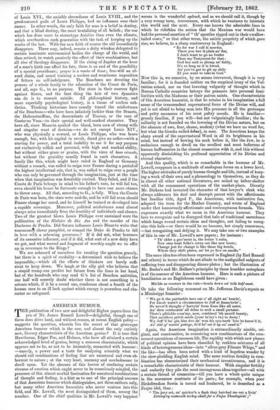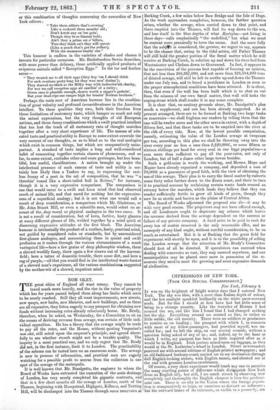AMERICAN HUMOUR.
THE publication of two new and delightful Biglow papers from the pen of Mr. James Russell Lowell—delightful, though one of them does drive hard, and without reason, at recent English policy— suggests the question, wherein lies the secret of that grotesque American humour which is the one, and almost the only entirely new, literary characteristic of the American genius ? It is true that Hawthorne, Edgar Poe, and Holmes, who have all attained a certain acknowledged level of genius, betray a common characteristic, which appears not to be, or not to be intimately, connected with humour : —namely, a power and a taste for analyzing minutely what we should call combinations of feeling that are unnatural and even ab- horrent to nature ; at the very least, uncanny and unwholesome to dwell upon. Yet the absence of this horror of confusing certain streams of emotion which ought never to be consciously mingled, the presence of this almost morbid fascination for unnatural combinations of thought and feeling, is a hint as to one of the principal sources of that American humour which distinguishes, not these authors only, but many other American humorists who never venture into this field, and Mr. Lowell, the most distinguished of them, among the number. One of the chief qualities in Mr. Lowell's very happiest verses is the wonderful aplomb, and as we should call it, though by
a very wrong term, irreverence, with which he ventures to intermix this world and the next. Every one knows the admirable lines in which he ridicides the notion that the Mexican war would have had the personal sanction of " th' apostles rigged out in their swallow- tailed coats," or that other verse, the satiric propriety of which gave rise, we believe, to a sharp controversy in England : "Es for war I call it murder, There you hey it plain an' kat, I don't want to go no furder Than my Testyment far that: God hez said so plump an' fairly, It's ez long ez it is broad, An' you've got to git up airly Ef you want to take in God."
Now this is, we conceive, by no means irreverent, though it is very familiar; for it is founded neither on the sceptical irony of the Vol- tairian school, nor on that lowering vulgarity of thought which in Roman Catholic countries betrays the peasants into personal fami- liarities with the Madonna or their patron saints. One characteristic of this American humorist, is that he retains in his imagination a full sense of the transcendent supernatural force of the Divine will, and yet is not afraid to bring man into His presence in all the grotesque and petty meanness of his most paltry moods. He is familiar— grossly familiar, if you will—but not vulgarizingly familiar; the fa- miliarity. is not founded on the lowering of the Divine nature, but on the absence of awe, fear, shame, modesty (what we have no word for, but what the Greeks called &awe), in man. The American keeps the sharp sword of the supernatural Word in all its brightness in his mind, but instead of bowing his neck before it, like the Jew, he is audacious enough to dwell on the smallest and most ludicrous of human buffooneries in the closest connexion with it, and this without apparently diminishing his profound appreciation of its Divine and eternal character.
And this quality, which is so remarkable in the humour of Mr. Lowell, reappears in a multitude of analogous forms on a lower level.
The higher attitudes of purely human thought and life, instead of keep- ing a work of their own and a phraseology to themselves, as they do in almost all other national literatures, are mixed up helter-skelter with all the commonest operations of the market-place. Directly Mr. Dickens had invented the character of that lawyer's clerk who always addresses his deaf and decrepit parent with the affectionate but familiar title, Aged P., the Americans, with instinctive fun, adopted the term for the Mother Country, and wrote of England under that humorously affectionate and contemptuous formula. This expresses exactly what we mean in tke American humour. They love to recognize and to disregard that halo of traditional sacredness which hangs round certain ideas and thoughts, not failing to ree,og- nize this halo—or there would be no humour, but simply coarseness, —but recognizing and defying it. We may take one or two examples of this in one of Mr. Lowell's new papers ; for instance: " Th' older a guv'ment is, the better 't suits,
New ones hunt folks's corns out like new boots; Change jest for change is like those big hotels, Where they shift plates, an' let ye live on smells."
The same idea has often been expressed in England (by Earl Russell and others) in terms which do not allude to the undignified subjects of suffering toes and disappearing dinner-plates ; but the illustration of Mr. Burke's and Mr. Hallam's principles by these humbler metaphors is of the essence of the American humour. Here is such a picture of humiliation as no Englishman could have given :
Mis'ble as roosters in the rain—heads down an' tails haff-mast.
Or take the following comment on Mr. Jefferson Davis's repute as a Mississippi financier :
"We go it the patriarkle here out o' all sight an' hearin',
For Jacob warn't a circumstance to Jeff at financierin' ; He never'd thought o' borryie from Esau like all nater, An' then confiscatin' all debts to sech a small pertater. There's plitickle econ'my, now, combined 'ith morril beauty, Thet sacrifices privit eends (your in'my's tu) to dooty ! Wy Jeff 'd ha' gin him five an' won his eye-teeth 'fore he know'd it,
An' slid of wastin' pottage, he'd ha' eat it up an' owed it."
Again, the American imagination is extraordinarily nimble, ori- ginal, and constructive, in conceiving new combinations of the com- monest operations of common life. The rapidity with which new phases of political opinion have been classified by reckless mixtures of all kinds of heterogeneous ideas—into "silver-grey Filmore Whigs," and the like—has often been noted with a kind of hopeless wonder by the slow-plodding English mind. The same restless fertility in com- bination has characterized their mechanical inventiveness, and it is a remarkable characteristic of their humour. With singular fertility and audacity they pile the most incongruous ideas together—all with a certain thread of connexion—till you have a whole quite unique in the scarecrow contrasts of its parts; for example, when poor
Birdofreedom Sawin is tarred and feathered, he is described as a Feejee idol, thus : "The jury sot, an' quickeen a flash they halched me out a livin' Extemp'ry mammoth turkey-chick for a Feejee Thanksgivin' ;" or this combination of thoughts concerning the cowardice of New York editors :
"Take them editors that's crowing' Like a cockerel three months' old ; Don't ketch any on 'em goin', Though they be so blasted bold ; Ain't they a prime set o' fellers, 'Fore they think on't they will sprout (Like a peach that's got the yellers), With the meanness bustin' out."
This humour is endless in the varieties of shades and classes it invents for particular occasions. Mr. Birdofreedom &twin describes, with more power than delicacy, those artificially applied products of oviparous animals called "Reception Eggs." In the tar and feather scene- " They treated me to all their eggs (they kep 'em I should think For sech ovations pooty long for they wuz mos' distincl; They starred me thick as the Milky way with indiscrim'nit cherity, For wot we call reception eggs air sunthin' of a rarity;
Green ones is plentille enough, skurce worth a nigger's gethrin', But your dead-ripe one ranges high for treatin' Nothun brethren."
Perhaps the main root of American humour lies in the combina- tion of great velocity and profound inconsiderateness in the American intellect. To these qualities they owe, both their freedom from those limitations of customary taste, which hamper so much uot only the actual expressions, but the very thoughts of old European nations, and those funny combinations which a swift practical intellect that has lost the track of all customary ruts of thought snatches together after a very short experience of life. The canons of edu- cated taste and practical utility in Europe to some extent overrule the very current of our thoughts, so as to blind us to the real analogies which exist in common things, but which are comparatively unim- portant. A standard of taste implies a long and well-considered habit of connecting together certain classes of phenomena, and so far, to some extent, excludes other and more grotesque, but less beau- tiful, less useful, classifications. A nation brought up under the intellectual pressure of such canons of taste and utility is cer- tainly less likely than a Yankee to say, in expressing, the rest- less frenzy of a poet in the act of composition, that he was "a threshin' round like a short-tailed bull in flu-time," for instance, though it is it very expressive comparison. The comparison is one that would occur to a swift and keen mind that had observed much of animal life, and that cared for nothing but the expressive- ness of a superficial analogy; but it is not what one would call a result of deep consideration, a comparison which Mr. Gladstone, or Mr. John Stuart Mill, or even a scientific man, would select on ac- count of the,deep moral or physical analogies in the two cases. It is not a result of consideration, but of keen, furtive, hasty glances at many different phases of life, welded together by a mind quick at discerning expressive attitudes at the first blush. The American humour is intrinsically the product of a restless, hasty, practical mind, not guided by considered rules or standards, but. by unconsidered first-glance analogies, and accumulating these in quaint and swift profusion as it rushes through the various circumstances of a much variegated life—here a few grains of deep philosophic wisdom, there a shrewd worldly fancy, there again a few straws out of the harvest- field; here a tatter of domestic trouble, there some dirt, and here a rag of purple,—all that you would find in the intellectual waste-basket of a shrewd man's experience, all the various combination, suggested by the mother-wit of a shrewd, impatient mind.































 Previous page
Previous page